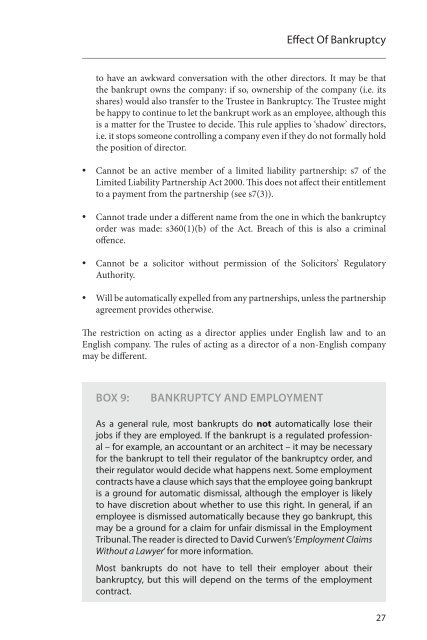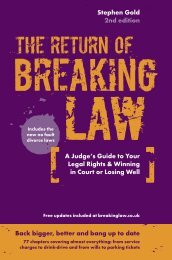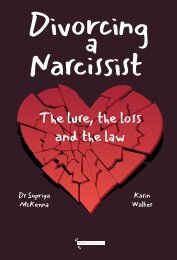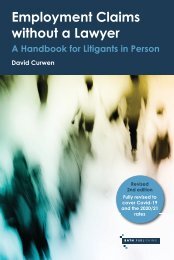Insolvency Made Clear: A Guide for Debtors
Plain English, practical guidance for anyone facing demands over a debt they are struggling to pay.
Plain English, practical guidance for anyone facing demands over a debt they are struggling to pay.
Create successful ePaper yourself
Turn your PDF publications into a flip-book with our unique Google optimized e-Paper software.
Effect Of Bankruptcy<br />
to have an awkward conversation with the other directors. It may be that<br />
the bankrupt owns the company: if so, ownership of the company (i.e. its<br />
shares) would also transfer to the Trustee in Bankruptcy. The Trustee might<br />
be happy to continue to let the bankrupt work as an employee, although this<br />
is a matter <strong>for</strong> the Trustee to decide. This rule applies to ‘shadow’ directors,<br />
i.e. it stops someone controlling a company even if they do not <strong>for</strong>mally hold<br />
the position of director.<br />
• Cannot be an active member of a limited liability partnership: s7 of the<br />
Limited Liability Partnership Act 2000. This does not affect their entitlement<br />
to a payment from the partnership (see s7(3)).<br />
• Cannot trade under a different name from the one in which the bankruptcy<br />
order was made: s360(1)(b) of the Act. Breach of this is also a criminal<br />
offence.<br />
• Cannot be a solicitor without permission of the Solicitors’ Regulatory<br />
Authority.<br />
• Will be automatically expelled from any partnerships, unless the partnership<br />
agreement provides otherwise.<br />
The restriction on acting as a director applies under English law and to an<br />
English company. The rules of acting as a director of a non-English company<br />
may be different.<br />
Box 9:<br />
BANKRUPTCY AND EMPLOYMENT<br />
As a general rule, most bankrupts do not automatically lose their<br />
jobs if they are employed. If the bankrupt is a regulated professional<br />
– <strong>for</strong> example, an accountant or an architect – it may be necessary<br />
<strong>for</strong> the bankrupt to tell their regulator of the bankruptcy order, and<br />
their regulator would decide what happens next. Some employment<br />
contracts have a clause which says that the employee going bankrupt<br />
is a ground <strong>for</strong> automatic dismissal, although the employer is likely<br />
to have discretion about whether to use this right. In general, if an<br />
employee is dismissed automatically because they go bankrupt, this<br />
may be a ground <strong>for</strong> a claim <strong>for</strong> unfair dismissal in the Employment<br />
Tribunal. The reader is directed to David Curwen’s ‘Employment Claims<br />
Without a Lawyer’ <strong>for</strong> more in<strong>for</strong>mation.<br />
Most bankrupts do not have to tell their employer about their<br />
bankruptcy, but this will depend on the terms of the employment<br />
contract.<br />
27













